
Delivering Data: How Our Partnership with the ILO is Providing Greater Insight on School-to-Work Transitions
Six years ago, The MasterCard Foundation and the International Labour Organization (ILO) set an ambitious goal: to increase the existing number of school-to-work transition surveys (SWTS) from five to 52 and integrate the data and analysis into publications and workshops. With access to accurate, up-to-date data, policymakers are better positioned to adopt policies aligned with the needs of young people and inform youth employment interventions nationally and globally.
Our partnership with the ILO was an opportunity to work with a globally recognized institution and to better understand the realities of young people entering the labour market in developing countries.
As the Work4Youth partnership comes to a close, both organizations have achieved important milestones and identified key learning:
The program met and exceeded its targets:
- 53 school-to-work transition surveys were completed across 34 developing countries.
- More than 186,000 young people participated in the surveys, representing 335 million persons between the ages of 15 and 29.
- 35 country-level analytic reports were published as well as five thematic reports, and four regional reports.
- Two versions of the ILO’s flagship publication, Global Employment Trends for Youth (which includes data from the survey) were published, and have been downloaded 190,000 times.
- Two databases were developed: YouthSTATS using the school-to-work transition data-sets, and YouthPOL is an inventory of more than 500 youth employment policies divided by country and theme; both of which are openly available.
- The project also conducted national and regional workshops, two symposia for researchers who accessed the data-sets and developed papers, technical assistance to staff from the National Statistical Offices at the training centre in Turin, and technical support to country offices to analyze the data and develop related polices.
An independent, final evaluation of the program found:
- The program responded to the need for youth-specific information regarding employment trends, wages, policies and practices. The school-to-work transition surveys methodology was recognized as more relevant for policy dialogue and policy development than information currently available from labour force surveys;
- New knowledge has provided global stakeholders with a portrait of youth transitions to work in specific countries, as well as regional and global comparisons. The knowledge products have been disseminated widely and have informed major publications on youth employment;
- In countries where the links to policy dialogue were most evident – some examples given were Ukraine, Samoa, Malawi, Uganda – the active involvement of a development partner in the policy process supported the application of data driven policy development.
Importantly, much of the value resulting from the partnership is yet unrealized. There remains a large set of stakeholders with an interest in the reports, microdata sets and the YouthPOL database.
Continued strategic investment to promote dialogue and partnership to ensure the use of these resources and their effective integration into global research and country-level activities will continue to sustain the value and impact of the project.
For The MasterCard Foundation’s Youth Livelihoods team, the project has demonstrated the challenges and opportunities associated with research, national dialogue and policy engagement. The country-level data has informed our work and the thematic reports on informality, gender, agriculture and skills mismatch has been particularly influential in improving our understanding of the labour market realities for young people in developing countries.
It is no surprise that the policy process is onerous. Nor is it surprising that good data doesn’t automatically lead to good policy-making without added levels of technical support, dialogue and engagement. However, what our partnership with the ILO demonstrated (and what is a critical learning for the Foundation moving forward) is that success will be measured by the degree to which we can make strategic investments and partnerships that combine quality data collection; sufficient support to ensure its integration into policy; and the time, space and support necessary for this to occur and be sustained at the national level.


